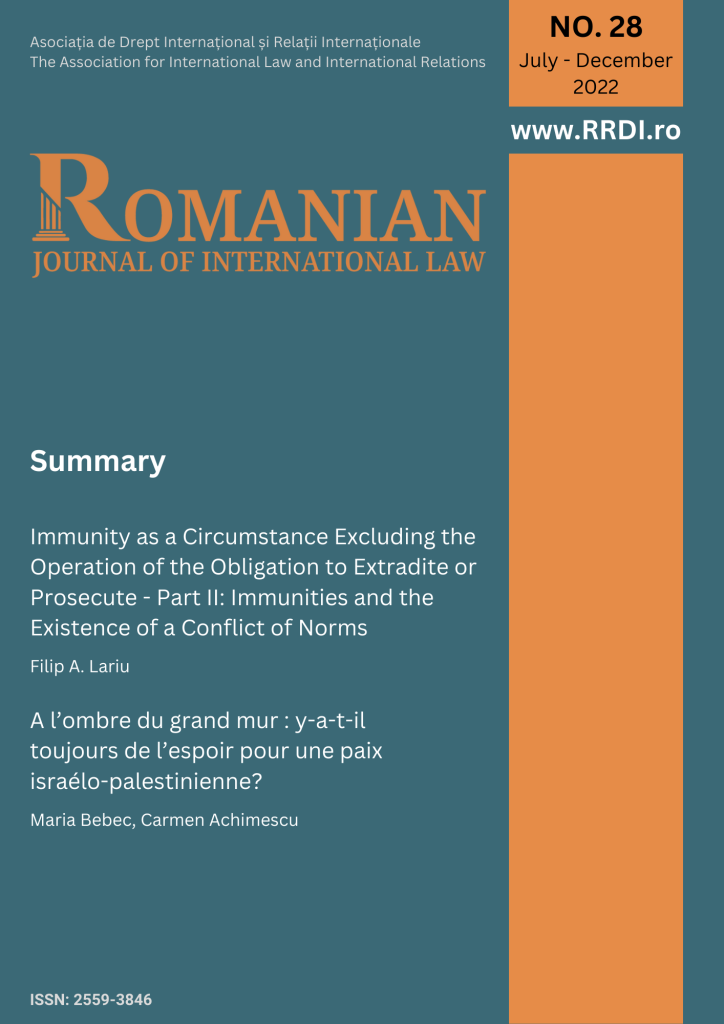Les mesures de politique sociale mises en œuvre par l’État roumain en faveur des citoyens étrangers et des apatrides qui proviennent d’Ukraine (Social policy measures implemented by the Romanian State in favor of foreign citizens and stateless persons from Ukraine)
Ana-Maria VLĂSCEANU
Ana-Mihaela V. ACATRINEI
Les implications de la situation en Ukraine pour les intérêts politiques, humanitaires et de sécurité de la Roumanie ont conduit à l’adoption urgente de mesures visant à fournir soutien et assistance humanitaires aux catégories de citoyens étrangers et d’apatrides ukrainiens en situations de vulnérabilité. L’étude vise à démontrer l’attitude de conformité de l’État roumain à l’égard des dispositions européennes en matière de protection temporaire en cas d’afflux massif de personnes déplacées, et les mesures visant à promouvoir un équilibre entre les efforts des États membres pour accueillir ces personnes et les conséquences de cet accueil, ainsi que les mesures effectivement adoptées. La présente étude aborde une analyse comparative des mesures de politique sociale récemment adoptées dans le contexte de la crise et des conditions dans lesquelles elles ont été accordées.
Les minorités en Ukraine – évolution historique et l’impact des conflits russo-ukrainiens (Minorities in Ukraine – historical development and the impact of Russian‑Ukrainian conflicts)
Elena LAZĂR
La guerre en Ukraine met en péril non seulement l’existence de la nation (multiethnique), mais aussi celle des sites uniques du patrimoine culturel des minorités dans tout le pays. L’existence et l’influence de la minorité russe dans le pays a amené à l’adoption des lois ayant des effets discriminatoires qui sont de nature à amplifier le conflit.
A l’ombre du grand mur : y-a-t-il toujours de l’espoir pour une paix israélo‑palestinienne ? (In the shadow of the Great Wall: is there still hope for Israeli-Palestinian peace?)
Maria BEBEC
Carmen ACHIMESCU
Le 30 décembre 2022, l’Assemblée générale des Nations Unies a adopté une résolution en vertu de laquelle il est demandé à la Cour Internationale de Justice de rendre un avis consultatif sur l’occupation prolongée par l’Israël du territoire palestinien. Un premier avis consultatif concernant le conflit israélo-palestinien avait été rendu en 2004, constatant l’illégalité de l’édification l’Israël, à partir de 2002, d’une barrière de sécurité dans les territoires occupés de Palestine. A présent, presque vingt ans plus tard, la cause palestinienne se trouve de nouveau à l’attention des juges de la Haye. Sans essayer d’anticiper la réponse de la Cour, on se demande néanmoins si le nouvel avis aurait plus d’écho que le premier.
The Development of the Jurisprudence of the International Court of Justice in the Examination of Territorial Disputes in Recent Times
Ioana-Roxana OLTEAN
Maritime delimitations refer to the legal process of determining the boundaries between adjacent or opposite states’ territorial waters and exclusive economic zones (EEZs)/continental shelves. This article aims at providing an overview of the case-law evolution of maritime delimitations and the principles and methods used in resolving such disputes. The article also examines the challenges and controversies that arise in the context of maritime delimitations, including the competing interests of states, the role of international law, and the impact on resource exploitation and conservation. Finally, the article explores the consistent approach of the ICJ of this topic.
Immunity as a Circumstance Excluding the Operation of the Obligation to Extradite or Prosecute – Part II: Immunities and the Existence of a Conflict of Norms
Filip Andrei LARIU
This article is the second in a trilogy that examines the interaction between the immunities of state officials and the obligation to extradite or prosecute. It focuses on personal and functional immunities, summarily comparing them and then analysing the instance where their observance would come into conflict with the obligation to extradite or prosecute. The doctrinal and comparative legal research employed highlights the contents of each obligation, emphasising the manner in which the conflict of norms occurs. Finally, it concludes that there really is a conflict between the two international obligations, and that in the absence of a hierarchical difference between the two, other rules for solving the conflict are required.
Detangling the issue of complete dependence and effective control in the case-law of the International Court of Justice
Maria R. BODEA
Ever since the International Court of Justice rendered its judgment in the Military and Paramilitary Activities In and Against Nicaragua case, discussions were raised on the issue of attribution, effective control and complete dependence. While the ICJ decided on this case more than 30 years ago, the issue of attribution and the standard of control re-emerged in the light of international discussions in the relevant doctrine even more so with the judgments of the Trial and Appeal Chambers in the Tadić cases which challenged the findings of the ICJ, and, lastly, with the latter’s judgment in the Application of the Convention on the Prevention and Punishment of the Crime of Genocide between Bosnia and Herzegovina and Serbia and Montenegro. This study wishes to detangle the issues regarding the attribution of the actions of private entities to the State, while clarifying the findings of the relevant case-law.

